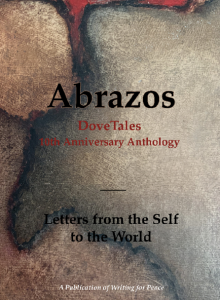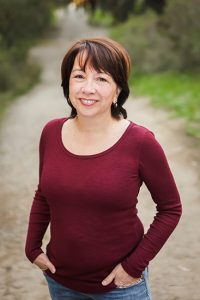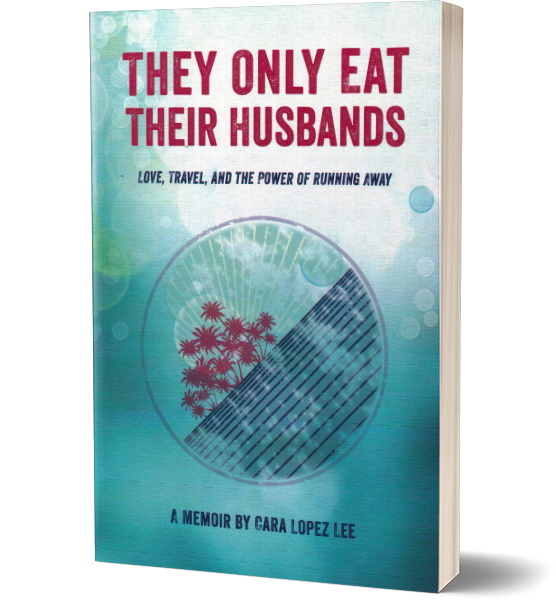 Do you feel it, the desire to tiptoe into the New Year, lest you wake a new giant that might confront you with another endurance test of our humanity, our environment, our peace? Yet it was with unexpected joy I opened my mailbox this holiday season to find a reminder to never give up on the power of words to open us to the possibility of a better world. That reminder is Abrazos, the 10th Anniversary Anthology of DoveTales, which is the literary journal of the nonprofit Writing for Peace. Below is a copy of my essay, The Dark Matter, which I was honored to discover included. If you’d like to buy the anthology, full of the work of writers for whom words are conduits of peace, limited copies are still available at WritingForPeace.org.
Do you feel it, the desire to tiptoe into the New Year, lest you wake a new giant that might confront you with another endurance test of our humanity, our environment, our peace? Yet it was with unexpected joy I opened my mailbox this holiday season to find a reminder to never give up on the power of words to open us to the possibility of a better world. That reminder is Abrazos, the 10th Anniversary Anthology of DoveTales, which is the literary journal of the nonprofit Writing for Peace. Below is a copy of my essay, The Dark Matter, which I was honored to discover included. If you’d like to buy the anthology, full of the work of writers for whom words are conduits of peace, limited copies are still available at WritingForPeace.org.
The Dark Matter
Cara Lopez Lee
I’ve been feeling the loneliness that comes with the realization that not only do others not see the world the same way as I, but that nobody sees it the same way at all. Not a one. Not even the people who vote the same. Not even the people who like the same movies, books, and dances. Not the dearest of friends.
This is not unusual. The space between two minds is vast, even when we embrace. It seems I never before noticed how the spaces between us change in size depending on the events swirling around us.
Our climate, and therefore everything that sustains life on this planet is careening toward crisis. Rocked by that idea, I can almost see the spaces between atoms. If there is a politics of fear, I feel that the destruction of our environment is the Big Bang from which that fear explodes.
Like dogs barking before a great quake, we feel something looming so we howl at each other. As if the seas and the heat rising to consume us care one whit for our religions or races or rights.
My husband once told me that everything we see is somebody’s opinion. The older I get the more this truth reveals itself.
In 2016, just before America unburied its hidden spaces once again, my husband and I visited Washington D.C. While there, we spent hours in the Smithsonian Institution’s Air and Space Museum, and my favorite moment was sitting in the planetarium to watch the short film Dark Universe, narrated by astrophysicist Neil deGrasse Tyson. In the film, Tyson explains that the planets, stars, and everything we can see makes up less than 5% of the universe. The other 95% is made of dark energy and dark matter.
That’s right, in a real way, we are incapable of seeing the universe as it is.
More astonishing was the idea that, if the universe is infinite, then it has no center. So where did the Big Bang start? Everywhere and nowhere.
All of this is humbling. We truly are stardust, a word that is one part brilliance and one part inconsequence.
We’re surrounded by news that is false and people who believe it. We have access to science that is empirical, and people who refuse to believe it. Yet the seas rise and the fires burn without pausing to consider what we believe.
This is a world where nothing feels real anymore. And we only see 5% of it.
Today I think of Yeats:
“Things fall apart; the centre cannot hold;
Mere anarchy is loosed upon the world”
With dread, I come to the end of his poem, The Second Coming:
And what rough beast, its hour come round at last,
Slouches towards Bethlehem to be born?
The answer to this renewed question is not a person, I think, not a politician. It is neither man nor woman, neither conservative nor liberal, neither bigot nor humanitarian. This rough beast, I fear, may be all of us: driving to work, flying to vacations, buying phones and laptops, turning on and off the lights, running hot water. Neither right nor wrong, but going about the simple business of living—by the billions.
Billions. On a planet that carries the same amount of water it held at the start, before the first human stood upright. Much of that water now resides inside us, all of us.
One day perhaps, there will be nothing left to drink but each other. Water that has no color. Water that is clear.
Then, perhaps, the spaces between us will shrink until they become invisible to the human eye. In that interstitial world, we may come to see something in each other that we have yet to imagine. Something we cannot yet see in the dark.




